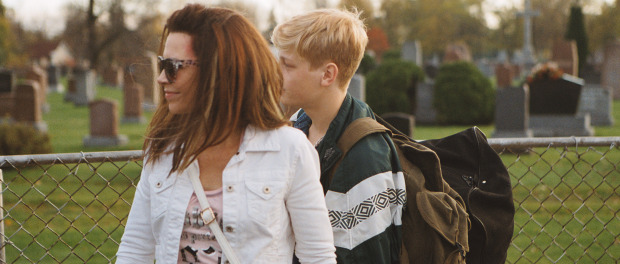Real Life Longueuil Style: Review of Mommy
For his fifth film Mommy, Xavier Dolan teams up once again with Anne Dorval and Suzanne Clément, and also features a new and young face, Antoine-Olivier Pilon.
Mommy tells the story of a widowed single mother, Diane “Die” Després (Anne Dorval), and her troubled violent son, Steve (Antoine-Olivier Pilon). She gets custody of Steve after he is kicked out of a juvenile center for having dangerously burnt a teenager. Together, they must find stability and learn to work together. As part of the lower middle-class of Longueuil, with her high heels and apple bottom jeans, Die tries to find decent jobs to help her get by.
Die finds out that her neighbor, Kyla (Suzanne Clément) is a teacher currently on “break.” Throughout the film, Kyla’s background is unknown and ambiguous but we can tell something happened in her life which has caused her to be introverted. She seems to be suffering from a burn out and is staying home to rest. Die asks her to help teach her son. The three of them develop an important and deep friendship, forming a new little family on their own. With Kyla’s help, they find stability and comfort. Hope and optimism grow and a bright future for Die and Steve seems to be possible.
Dolan’s Mommy is different from his other films. The story line is a lot more relatable and is able to reach a larger audience. For example, the characters in Les Amours Imaginaires were caricatures and very exaggerated; this worked perfectly with the film though it was hard to relate to them in any way. Die, Steve, and Kyla are not characters; they are real people. They exist and their situation is real. The French language, slang and Anglicism are hilarious, accurate and well depicted. The dialogues flows out of the actors’ mouths like it’s unscripted, like it’s real life and not acting. Just like the actors’ performances, everything seems effortless and natural.
I worried at first, thinking the movie might end well à la Hollywood with the perfect ending but don’t worry, Mommy does not end in a cliché. Dolan’s touch sparks in this film through cinematography, costume designs, and colours. He again manages to impress our eyeballs. He has an amazing vision when it comes to details, the way Die chews her gum, the close-up on her thong when she tries to fix her jeans, or the exaggerated amount of key chains she has.
I have always looked forward to music in Dolan’s films. He previously featured underground artists such as Fever Ray, Vive La Fête, Visage, Moderat, the kind of music you would not hear on the radio. However, he took a different approach with Mommy. It features songs we all know so well and have heard many, many times before, like Oasis’ Wonderwall, Counting Crows’ Color Blind, or Céline Dion’s On Ne Change Pas. These songs are so popular and we all have a certain attachment to them due to their popularity. The music helps to evoke emotions from the viewers and create a stronger attachment to the characters.
Mommy is a story of hope, dreams but also, of struggle and reality. It is a true and honest picture of a mother and son’s relationship. They are not just a family, at this point, they are a team and have to look after one and another even if it seems impossible. You will laugh. You will cry. I guarantee you Mommy makes you feel as if you were part of their family. You sense their emotions and struggles, the lows and highs. You want them to succeed. You fall in love with them, you fall in love with their poisonous relationship and you wish them the best.
This film is a masterpiece beyond feelings, if that can even make sense. When the movie was over, I had to take a deep breath before leaving my seat. My face was covered in tears. I was completely heartbroken and upset. When Mommy was previewed at the Cannes Festival, people applauded for twelve minutes straight. Well, I would have clapped for thirty.
Mommy is playing now in theatres. For Lili Hudecova’s pictures of the red carpet premiere, click HERE.








